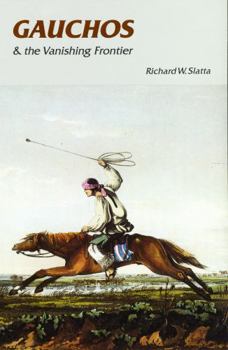Gauchos and the Vanishing Frontier
Select Format
Select Condition 
Book Overview
Although as much romanticized as the American cowboy, the Argentine gaucho lived a persecuted, marginal existence, beleaguered by mandatory passports, vagrancy laws, and forced military service. The... This description may be from another edition of this product.
Format:Paperback
Language:English
ISBN:0803292155
ISBN13:9780803292154
Release Date:September 1992
Publisher:University of Nebraska Press
Length:273 Pages
Weight:0.75 lbs.
Dimensions:0.8" x 5.6" x 8.6"
Related Subjects
Argentina History Latin America Social Science Social Sciences South America State & LocalCustomer Reviews
3 ratings
History of a Cultural Extinction
Published by Thriftbooks.com User , 23 years ago
Slatta brings the Argentine gaucho alive in all his splendor and squalor. One gains an appreciation for the extraordinary lives of this equestrian people who almost literally lived in the saddle. The author depicts life on the pampa in sometimes searing realism: a hard, state-of-nature life, but one the gaucho himself would not have changed (and did not change at the few junctures where he had the chance). Slatta presents a structuralist history of one of the W. Hemisphere's most colorful and renowned peoples. In other hands this approach might minimize the role of personality and personal choice, as though the gaucho bobbed helplessly on the rough seas of impersonal historical force acting thru the medium of latin culture. Not so here. The author dispassionately shows that the gaucho's fierce independence and tribalism contributed directly to the demise of his culture in its collision with mainstream Argentine society on the pampa. It could not be otherwise. Modernity was simply incomprehensible to the gaucho. One could not be gaucho and latino at the same time, and civilization destroyed the gaucho way of life. Slatta explores obvious parallels with other horse cultures such as that of the Mongols, the American Indian and the American cowboy. He demonstrates subject mastery in a wealth of detail concerning equipment, words, and convergent ways of handling similar challenges. The inherent drama of the gaucho story had echoes of "Monte Walsh" sounding in my mind as I finished the work. This thoroughly readable book is enjoyable both as history and as entertainment.
A fascinating glimpse of a lifestyle long gone
Published by Thriftbooks.com User , 25 years ago
Slatta brings the Argentine gaucho alive in all his splendor and squalor. One gains an appreciation for the extraordinary lives of this equestrian people who almost literally lived in the saddle. The author depicts life on the pampa in sometimes searing realism: a hard, state-of-nature life, but one the gaucho himself would not have changed (and did not change at the few junctures where he had the chance).Slatta presents a structuralist history of one of the W. Hemisphere's most colorful and renowned peoples. In other hands this approach might minimize the role of personality and personal choice, as though the gaucho bobbed helplessly on the rough seas of impersonal historical force acting thru the medium of latin culture. Not so here. The author dispassionately shows that the gaucho's fierce independence and tribalism contributed directly to the demise of his culture in its collision with mainstream Argentine society on the pampa. It could not be otherwise. Modernity was simply incomprehensible to the gaucho. One could not be gaucho and latino at the same time, and civilization destroyed the gaucho way of life.Slatta explores obvious parallels with other horse cultures such as that of the Mongols, the American Indian and the American cowboy. He demonstrates subject mastery in a wealth of detail concerning equipment, words, and convergent ways of handling similar challenges. The inherent drama of the gaucho story had echoes of "Monte Walsh" sounding in my mind as I finished the work.This thoroughly readable book is enjoyable both as history and as entertainment.
A fine intro. to Argentine history for US readers.
Published by Thriftbooks.com User , 25 years ago
Slatta's book works well when assigned to college undergraduates, because he covers complex and important issues in an engaging style. The subject of gauchos should be fascinating as well to lay readers interested in US cowboys & frontier history, because Slatta provides a clear basis for comparative history. 10-15 years ago it would have deserved a 5-star rating, but "Gauchos" has stimulated further research which is beginning to modify, or at least extend, its conclusions (cf. J. Lynch, "Massacre in the Pampas 1872"). Nevertheless, Slatta's book remains the place to begin expanding one's understanding of New World frontier history.






